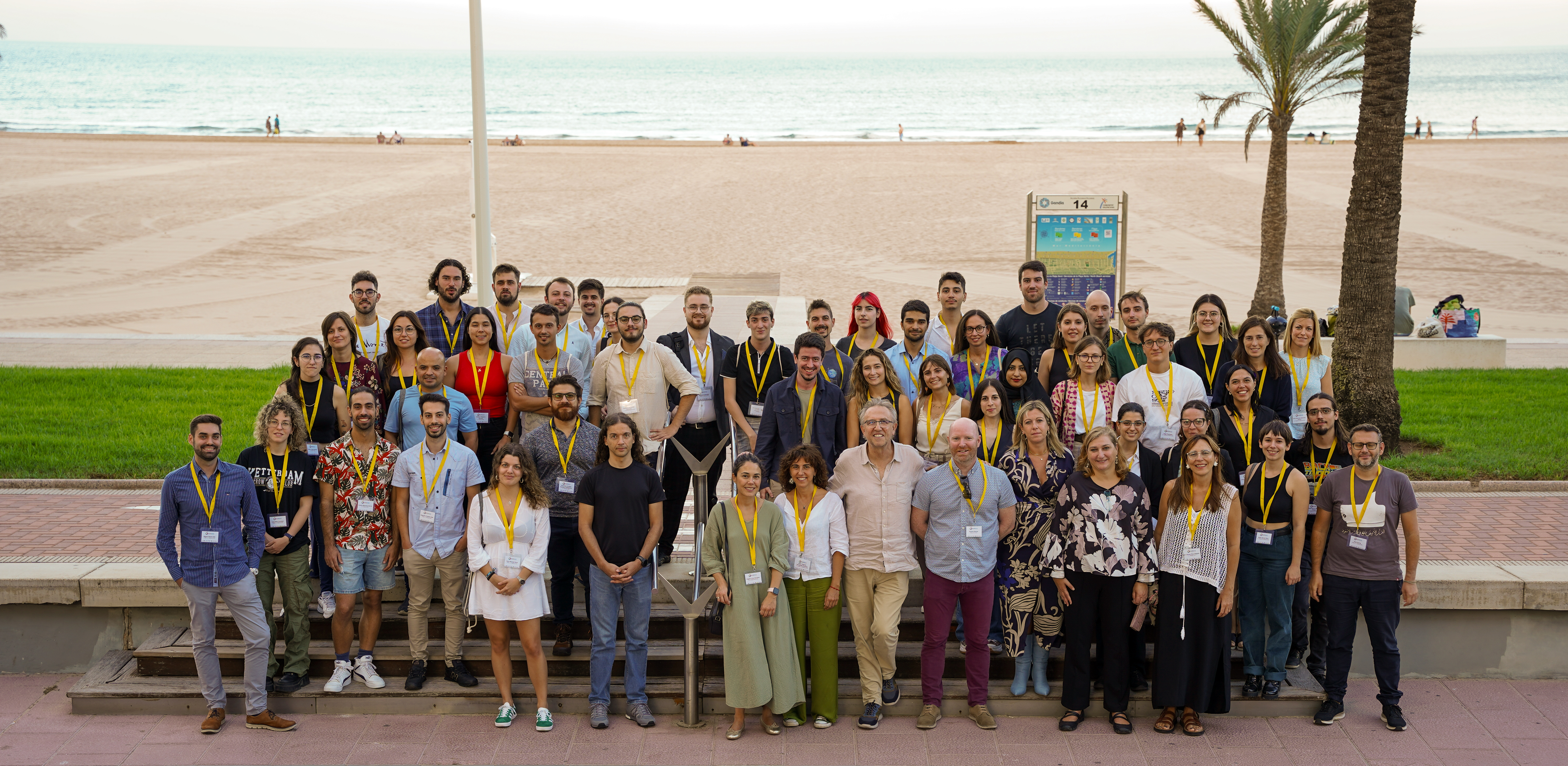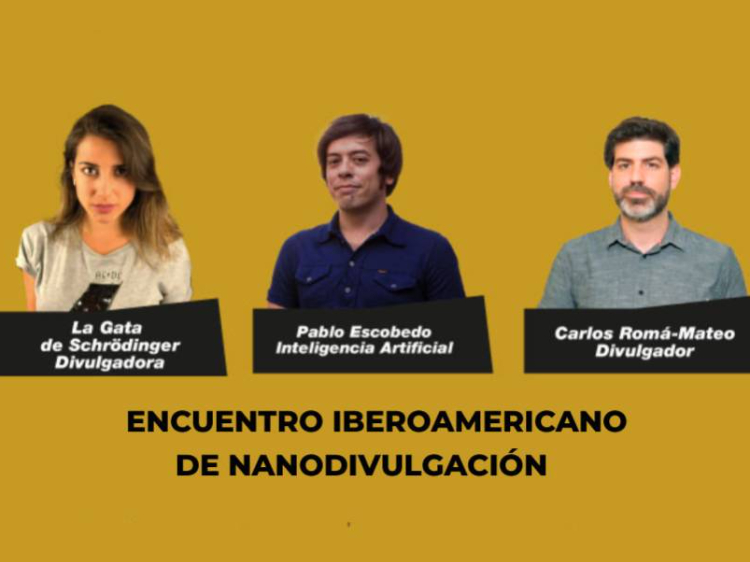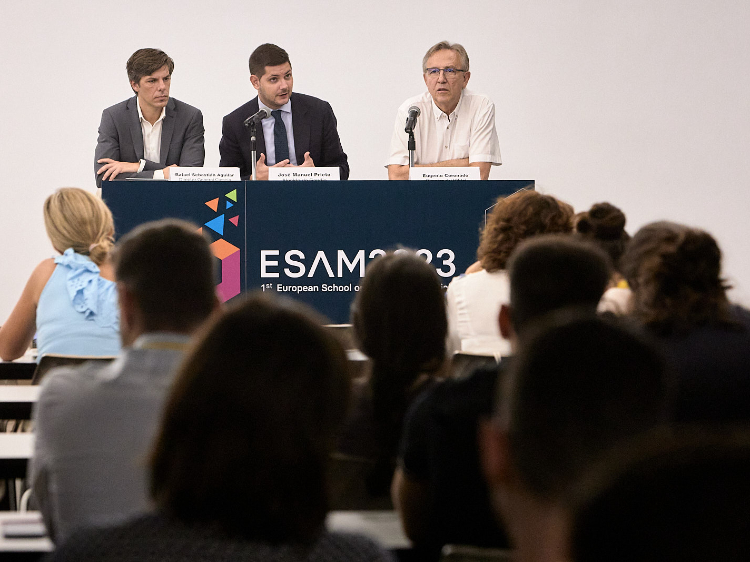La primera edición de la Escuela Europea de Materiales Avanzados (#ESAM2023) ha reunido en Gandia entre los días 16 y 18 de Octubre a cerca de 80 investigadores españoles y europeos que han debatido sobre el diseño y la aplicación tecnológica de los diferentes tipos de materiales con propiedades avanzadas, entre ellos el grafeno y muchos “materiales inteligentes” diseñados intencionalmente para ofrecer rendimientos superiores en áreas clave para la economía de alta tecnología.
La Escuela Europea de Materiales Avanzados es una de las acciones de formación, colaboración científica y de difusión de resultados previstas en el Plan Complementario de I+D+I en Materiales Avanzados impulsado por el Ministerio de Ciencia del Gobierno de España junto a los ejecutivos de siete Comunidades Autónomas. Forma parte del Plan de Recuperación, Transformación y Resiliencia financiado por la Comisión Europea y de la Estrategia Española de Ciencia, Tecnología e Innovación (2021-2027)
Durante el acto de apertura de la reunión, celebrada en el hotel Bayrén, el catedrático de la Universitat de València y director del Instituto de Ciencia Molecular (ICMol) de la Universitat de València, Eugenio Coronado, explicó que este tipo de acciones contribuyen a uno de sus objetivos principales: “Estamos construyendo una comunidad científica estratégica para la industria y la economía de España y Europa”. También para la vida de las personas, puesto que los materiales avanzados permiten productos más baratos, sofisticados y fáciles de usar.
Como coordinador nacional del programa, el profesor Coronado expresó su vocación por consolidar la continuidad de la ESAM y la colaboración entre los investigadores implicados los proyectos del plan complementario. Como herramienta se ha lanzado y ya está disponible AM@ESP (Advanced Materials Spain), la plataforma digital que integra y permite búsquedas de los centros, grupos de investigación y proyectos ligados a la investigación en esta área, que abarca, entre otros, la química, la física, la nanotecnología, la metalurgia o los biomateriales.
El buscador AM@ESP no sólo es la web informativa del plan complementario que arrancó a finales de 2022, sino que supone un significativo esfuerzo realizado por recopilar y estructurar de manera interactiva la información y el contacto de centenares de grupos y centenares de investigadores que participan de manera integrada y colaborativa en las líneas estratégicas fijadas en el proyecto. “Queremos sea una base sólida para la comunidad de investigadores en materiales avanzados porque España es uno de los países que más trabaja este campo”.
ESAM ha contado con la participación de los grupos españoles y europeos más activos en el campo de los Materiales Avanzados. Se han presentado resultados de investigación para su debate con las generaciones más jóvenes (estudiantes de máster, doctorado y postdoctorado), que también han tenido la oportunidad de presentar los avances de sus trabajos.

Entre los ponentes invitados han destacado el profesor Lapo Bogani, profesor de Nanomateriales Molecular en el departamento de Materiales de la Universidad de Oxford; Nazario Martín, profesor de Química Orgánica de la Universidad Complutense de Madrid y vice-director del Instituto de Estudios Avanzados en Nanociencia de Madrid (IMDEA-Nanociencia); Petra Rudolf, ex presidenta de la Sociedad Europea de Física y profesora de la Universidad de Groningen o Kasper Pedersen, catedrático de Química Inorgánica de la Universidad Técnica de Dinamarca.
También se contó con la participación de Talal Mallah, investigador del Instituto de Química Molecular y de los Materiales de Orsay (ICMMO), en la Universitat de Paris-Saclay. También han sido ponentes invitados José Ramón Galán, investigador ICREA en el Instituto Catalán de Investigación Química (ICIQ); Marisol Martín González, coordinadora científica y técnica del área global de la Materia en el CSIC o Félix Zamora, catedrático de la Universidad Autónoma de Madrid y vicerrector de Transferencia de la misma institución. Richard Murray, editor de la revista Wiley aportó algunas claves sobre la publicación de artículos científicos.
A la sesión inicial de la escuela asistieron el director general de Ciencia e Investigación de la Generalitat valenciana, Rafael Sebastián Aguilar, y el alcalde de la ciudad, José Manuel Prieto, quienes subrayaron la relevancia de la investigación científica para el avance en “sectores esenciales”. Sebastián, además, destacó el “trabajo colaborativo” y la “multidisciplinariedad” como dos claves para que el conocimiento científico “se consolide y sea realmente útil”, alineándose con las estrategias del Gobierno de España y de la Unión Europea.
José Manuel Prieto recalcó el “compromiso” de Gandia por acoger este tipo de reuniones “que suman investigación y tecnología”. Según dijo, su gobierno tiene vocación de ser, a la vez, “destino turístico, pero también destino inteligente”. Citó como ejemplo que la ciudad será sede del Instituto Nacional de Oceanografía.
Los planes complementarios del Gobierno de España cuentan con una financiación de 466 millones de euros y abarcan ocho áreas de interés científico-técnicas: Biotecnología aplicada a la salud; ciencias marinas; comunicación cuántica, energía e hidrógeno renovable; agroalimentación; astrofísica y física de altas energías y biodiversidad. 466 millones de euros hasta 2025. El de materiales avanzados tiene asignados 53 millones de euros hasta 2025.











